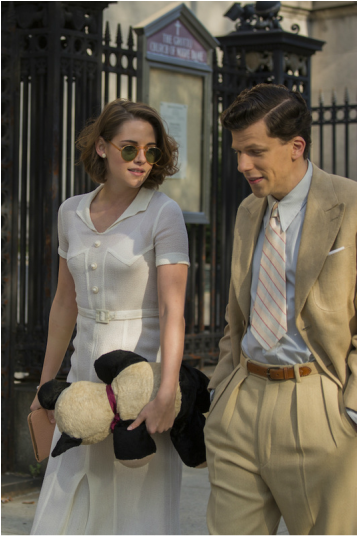Review:
"Cafe Society"

Release Date: July 29, 2016
Rating: PG-13 Running Time: 96 minutes Granted, Woody Allen is held to impossibly high standards because of the many classic comedies and dramas he has written and directed since 1966. How many directors working today have not made their fair share of clunkers over the course of the past 40-50 years? In the case of Allen, it’s magnified because he makes an average of one film a year, whereas Steven Spielberg and Martin Scorsese work at a slower pace. But that doesn’t mean a minor work such as Café Society cannot be considered a disappointment when viewed within the context of past similar work. This 1930s-set morality tale about fame and glamor finds Allen covering too much familiar ground without saying anything new about his favorite subjects: May-December romances, love triangles, youthful ambition vs. middle-aged malaise, and the guilty conscience. It also lacks the dramatic weight of Crimes and Misdemeanors, Match Point, and Blue Jasmine. The change of scenery—Hollywood vs. New York—works more to Allen’s favor than it did for Hollywood Ending, but Café Society doesn’t skewer show business with the same wit and precision as Bullets over Broadway. In fact, Café Society seems mostly concerned with namedropping. Jesse Eisenberg’s Bobby is the die-hard New Yorker who relocates to Hollywood to work at the talent agency run by his Uncle Phil (Steve Carell). Bobby quickly falls for Phil’s secretary Vonnie (Kristen Stewart). He is taken by her refreshing lack of interest in the celebrity culture that drives Hollywood. Vonnie, of course, is already seeing the married Phil on the side. Back home in New York, Bobby’s gangster brother Ben (Corey Stoll) is causing problems that will heavily inform Café Society’s final act. Café Society naturally finds Eisenberg and Carell playing the young and middle-aged stand-ins, respectively, for Allen. After an opening scene that suggests Bobby is going to be nothing more than annoying bundle of nerves throughout Café Society, Eisenberg finds within the native New Yorker an inner strength and confidence that are often absent from the other younger male protagonists found in Allen’s films. Sure, the prospect of love drives him nuts, but Bobby can handle the business side of his life with assurance. Carell seems as out of place in Café Society as Will Ferrell did in Melinda & Melinda. Carell does irrational and obsessed well—see The Office—but in Café Society he fails to articulate the moral dilemma facing his married mover and shaker with the necessary authenticity to believe he’s struggling with his inner demons over trading his wife for a younger woman. Stewart acquits herself with grace and dignity as “the other woman,” but she slyly guards a part of Vonnie that no one suspects lies within her until it is revealed in the final act. Café Society’s secret weapon is the radiant Blake Lively, who brings the most honesty to the proceedings as the kind and considerate divorcée who catches Bobby’s eye. Unfortunately, her Veronica by Allen is treated as nothing more than a mirror image of Vonnie, one that allows Bobby to reflect on what his life is and what his life could have been. Café Society perks up with Veronica’s entrance, which comes when Bobby returns to New York and goes to work in his brother’s nightclub. There isn’t enough of Stoll’s Ben in Café Society, which is a shame because Bobby and Ben share a strong bond that would have been worth Allen’s time to explore within the context of Bobby’s rise and Ben’s fall. Instead, Café Society is content to immerse itself in a vacuous world—one that is beautifully shot by Vittorio Storaro and designed by Santo Loquasto—without truly offering any insights into what makes it run. Robert Sims Aired: July 28, 2016 Web site: http://www.cafesocietymovie.com |
|
